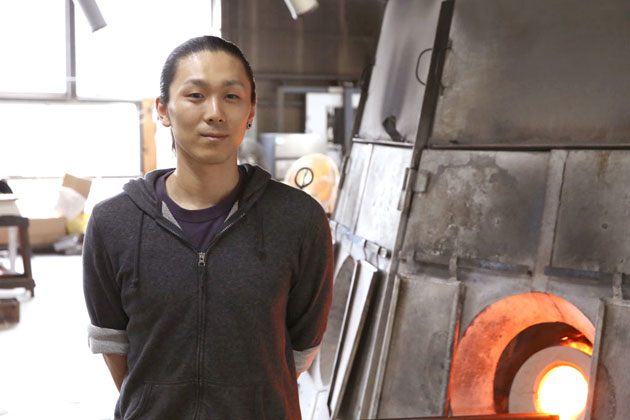
Interview: Glass Artisan Ela
Sghr (Sugahara), is a glass workshop in Kujukuri in Chiba prefecture where the artisans are involved through out the manufacturing process, from design to production. From a small workshop that is exists within the colorful scenery, countless number of glass products are produced every year, each carrying a message of "becoming a significant part of people's daily lives." As the artisan, Mr. Era told us his passion for maximizing the beauty of hand-made glasses.
JAPANTWO(JP2):How did you start working at Sghr (Sugahara)?
Toru Ela (Mr. Ela):There was a glass studio near my house so, since I was child, I was always interested in what they were doing. I always observed them thinking how fun it would be working there. When I graduated from high school, the glass studio happened to be looking for employees so I applied. That's how I began this career. For 3 years, I kept on working with glasses in my home town Otaru, but as I continued working, I wanted to learn more advanced techniques, so I began searching for workshops and ended up in Sghr (Sugahara).
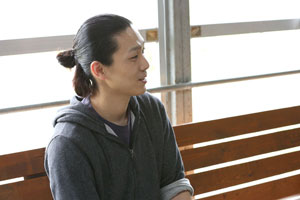
JP2:Why did you want to become an artisan?
Mr. Ela:I guess its my aspiration towards the classy and skilled senior artisans. This applies to my past as well as my present job, but the motivation to raise myself to the next level comes from having this aspiration to become like a particular person. I think this feeling also helps me to continue pursuing this career.
JP2:What gives you the most satisfaction working as a glass artisan?
Mr. Ela:I feel satisfied when the customers purchase my products and see how pleased they are. The Sghr (Sugahara) store is located beside the workshop, so I often drop by. When I see the customers delighted with their happy faces, I feel that I need to work hard even in the heat. Sometimes there are customers who request to speak to the artisan. Then, I would directly meet them and explain the product. It's great to see many customers becoming more interested in our products through these interactions, and it's nice to see many go home pleased with their purchase. Also, when we get orders, it really makes me happy and motivates me to know that there are people expecting my products.
JP2: As a Sghr (Sugahara) artisan, what's something that you always keep in mind?
Mr. Ela:There are both veterans and young artisans working at Sghr (Sugahara), but our average age is younger than those of other workshops. We still get youngsters joining our workshop, so I try to be flexible and receptive to new things, while conserving and learning the techniques from the older artisans and passing them on to the next generation.

JP2:What is something that is passed down amongst Sghr (Sugahara) artisans?
Mr. Ela:I believe the technique to keep the glass alive even when the products are on the shelf. When the glass is melted, it sparkles and looks as if it is living, so we express this state as being alive. When I see a finished glass product with its sparkles and gloss, I feel like, "Wow. I was able to make the product in its living state, effortlessly." Of course there are times when things are hard to make and we fail. Then I feel like, "The glass has died for putting too much strain on it." But the technique we have acquired to manufacture glasses in their living states is the direct result of the the senior artisans' hard work and skills that were passed down to us.
JP2:What attracts you to this job of creating things?
Mr. Ela:It's the ability to shape things that you love and want. I am able to recommend my products to the customers with confidence just because I am making things that I love and would like to have myself.
JP2:What is important when making a product?
Mr. Ela:It's to make things that you would want to have, and to draw out the glass' maximum potential. The most important thing is the transparency of the glass, so I try to maintain the transparency while adding my individuality in my products. Other than that, I try to make things that can be easily used by the customers.
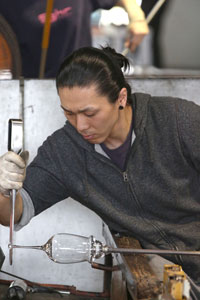
JP2:I've heard that you specialize in making wine glasses; what are their charm?
Mr. Ela:You form the stem's thickness and length using your senses: you adjust the strength and the temperature using your eyes, and you define the stem's thickness and length using your hands. It's a really intricate work; that's the charmof it. There are only few companies making glasses domestically, in Japan. And the people working there are old artisans who are called veterans. Maybe, Sghr (Sugahara) is the only place where youngsters are developing their skills and making wine glasses. That's why I believe others cannot do the things we do, and it's satisfying working here.
JP2:What's something that you pay attention to while you are making the wine glasses?
Mr. Ela:The communication with the glasses. As I mentioned earlier, during the process when I stretch the wine glass' stem, it tells me if I can "pull" or "not pull" depending on the movement and the expression of the glass. I naturally acquired this understanding of the glass' intention, after I had made each and every wine glasses with my hands, hundreds and thousands of times. When you capture the glass' intention and gives me the "go" sign, I start pulling the stem. I always pay extra attention during this process.
Also, we must work as a team for this process, so if one person makes a mistake the entire product is ruined. That's why, in order to keep working with a good flow, I pay close attention to the various decisions everyone makes during the process.
JP2:What did you focus on when you made Florilege's wine glasses?
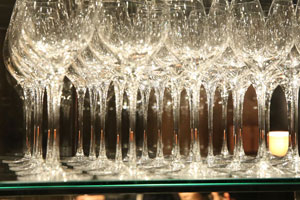
Mr. Ela:I would say, the thickness and the length. If there's a discrepancy between their thickness and their heights, they will look funny in the restaurant's show case. So I tried to match them. Normally, you would get the unique variation for hand-made products, but when it came to Florilege glasses, they've indicated the stem thickness, so we did not compromise. There were many moments when we broke the glasses that were thicker than the stated measurement. Also when a speck of dust in the air enters the glass, little bubbles are formed. We really paid attention to these little bubbles, since they show up especially in these thin wine glasses.
JP2:How do you communicate with the team members while you are working?
Mr. Ela:It's mostly through eye contacts. When it comes to crucial sections, we discuss about it. But as we get used to the job, we understand what others are thinking. The most important thing is for everyone to respect each other. However, I always say to "become that person." For example, my partner can step in my shoes and naturally figure out what I want to do next. If everyone thinks, "If I were that person, what would I do? How would I do it?" we would be able to communicate without saying a word, and we can work efficiently.
It's challenging, but that's why many enjoy doing it; You can never do it if you don't love it.
JP2:Could you leave a message for everyone?
Mr. Ela:I want everyone to have many memorable moments with the glasses, day after day, until the day it breaks. It's obviously not cheap. I want to make quality products and I want people to use them on a daily basis and say, "I'm glad that I bought this. I want to get another one." Also, I want them to buy their own favorite glasses and use them in their daily lives.
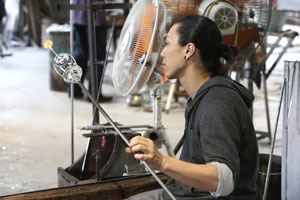
JP2:Lastly, could you tell us about your future goal?
Mr. Ela:I not only want to be number 1 in this workshop, but my goal is to be the best in Japan. I'm competitive and hate losing. At this moment, I am the best in many areas of work, yet there are also areas where others are better. But, I'd like to continue improving my overall skills regardless of me being better at one thing or another. And one day, I would like the people around the world to recognize me as a wine glass artisan and say, "You'll never go wrong with Ela if you need wine glasses."
Sugahara Glassworks Inc.
